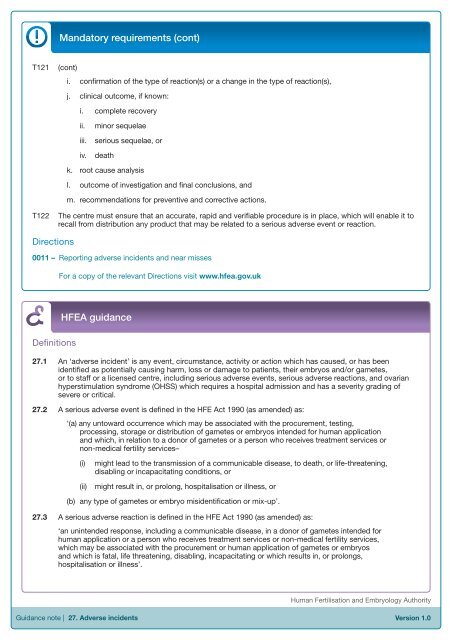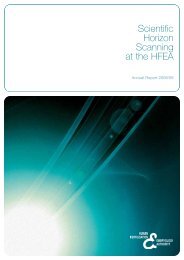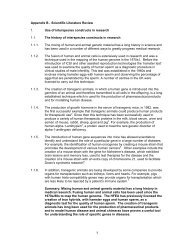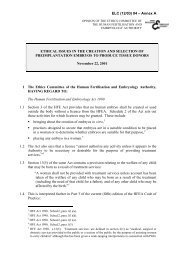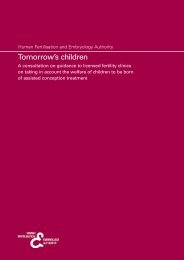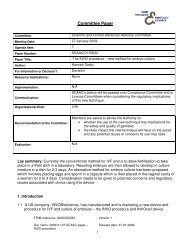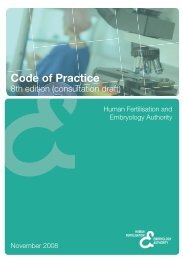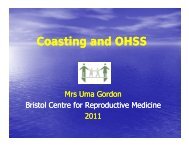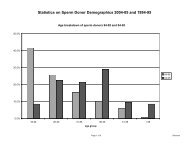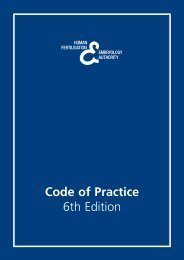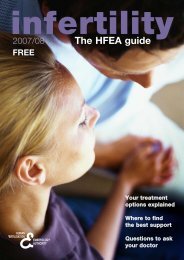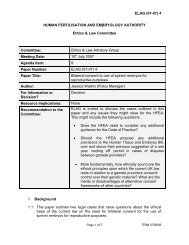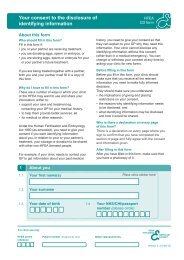Eighth Edition - R.3 - Human Fertilisation & Embryology Authority
Eighth Edition - R.3 - Human Fertilisation & Embryology Authority
Eighth Edition - R.3 - Human Fertilisation & Embryology Authority
Create successful ePaper yourself
Turn your PDF publications into a flip-book with our unique Google optimized e-Paper software.
Mandatory requirements (cont)<br />
T121<br />
(cont)<br />
i. confirmation of the type of reaction(s) or a change in the type of reaction(s),<br />
j. clinical outcome, if known:<br />
i. complete recovery<br />
ii.<br />
iii.<br />
iv.<br />
minor sequelae<br />
serious sequelae, or<br />
death<br />
k. root cause analysis<br />
l. outcome of investigation and final conclusions, and<br />
m. recommendations for preventive and corrective actions.<br />
T122<br />
The centre must ensure that an accurate, rapid and verifiable procedure is in place, which will enable it to<br />
recall from distribution any product that may be related to a serious adverse event or reaction.<br />
Directions<br />
0011 – Reporting adverse incidents and near misses<br />
For a copy of the relevant Directions visit www.hfea.gov.uk<br />
Definitions<br />
HFEA guidance<br />
27.1 An ‘adverse incident’ is any event, circumstance, activity or action which has caused, or has been<br />
identified as potentially causing harm, loss or damage to patients, their embryos and/or gametes,<br />
or to staff or a licensed centre, including serious adverse events, serious adverse reactions, and ovarian<br />
hyperstimulation syndrome (OHSS) which requires a hospital admission and has a severity grading of<br />
severe or critical.<br />
27.2 A serious adverse event is defined in the HFE Act 1990 (as amended) as:<br />
‘(a) any untoward occurrence which may be associated with the procurement, testing,<br />
processing, storage or distribution of gametes or embryos intended for human application<br />
and which, in relation to a donor of gametes or a person who receives treatment services or<br />
non-medical fertility services–<br />
(i)<br />
(ii)<br />
might lead to the transmission of a communicable disease, to death, or life-threatening,<br />
disabling or incapacitating conditions, or<br />
might result in, or prolong, hospitalisation or illness, or<br />
(b) any type of gametes or embryo misidentification or mix-up’.<br />
27.3 A serious adverse reaction is defined in the HFE Act 1990 (as amended) as:<br />
‘an unintended response, including a communicable disease, in a donor of gametes intended for<br />
human application or a person who receives treatment services or non-medical fertility services,<br />
which may be associated with the procurement or human application of gametes or embryos<br />
and which is fatal, life threatening, disabling, incapacitating or which results in, or prolongs,<br />
hospitalisation or illness’.<br />
<strong>Human</strong> <strong>Fertilisation</strong> and <strong>Embryology</strong> <strong>Authority</strong><br />
Guidance note | 27. Adverse incidents<br />
Version 1.0


